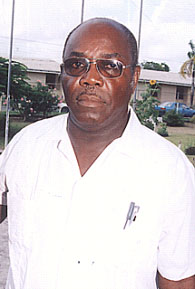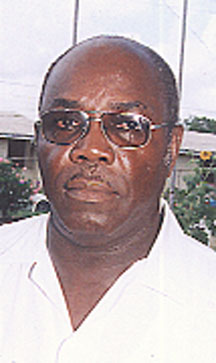Embattled Chairman of the Public Service Commission (PSC) Carvil Duncan has secured temporary court orders to halt the work of the tribunal set up to investigate whether he ought to be removed from the post.
Justice Franklin Holder on Wednesday issued the orders based on a Notice of Motion filed last week on behalf of Duncan, whose lawyers argued that Prime Minister Moses Nagamootoo’s advice to the President, which led to the set up of the tribunal, was unconstitutional.
Duncan last week moved to the High Court to challenge the legality of the tribunal after a request by his attorneys, Anil Nandlall and Satesh Satram, for it to suspend its work while criminal charges against him are still pending, was rejected.

The tribunal comprises Justice Roxane George, who is the Chairperson, Justice (ret’d) Winston Patterson and attorney Robert Ramcharran, who were sworn by President David Granger on September 15.
Duncan has been charged with stealing and conspiring to steal from GPL, while he was a serving member of its governing board. It was alleged that he stole $984,900, and conspired with another to steal $27,757,500, which was also property of GPL. The charges against Duncan stem from payments that were made to him and to former Deputy Chief Executive Officer Aeshwar Deonarine and which were uncovered by a forensic audit that was commissioned after the APNU+AFC government entered office last year.
Based on the application by Duncan’s lawyers, Justice Holder issued an order directed to Nagamootoo, “quashing his advice tendered to the President on or about the 14th day of September, 2016, pursuant to Article 225 (4) of the Constitution that the question of removing the Applicant from office as a member and chairman of the Public Service Commission, Judicial Service Commission and the Police Service Commission, ought to be investigated, on the grounds that the said advice was tendered unconstitutionally, unlawfully, illegally, prematurely, prejudicially, contrary to the rules of natural justice, arbitrarily, capriciously and in breach of the Applicant’s legitimate expectation and is null, void and of no effect, unless sufficient cause is shown why the Order of Rule Nisi of Certiorari should not be made absolute.”
It has also been ordered that the tribunal and each of the members appointed be prohibited from proceeding to investigate Duncan’s removal from offices.
Duncan’s application argues that Nagamootoo’s advice to the president was unlawful because Duncan was never afforded the opportunity to be heard prior to the decision to move to initiate the investigation and that the set up of the tribunal was in violation of his constitutional right to the presumption of innocence. Although Nagamootoo has claimed that Duncan was written about the tribunal in March, the trade unionist has maintained that he never received any correspondence and that his requests to the Prime Minister to prove delivery have been ignored.
“…the tribunal has been established for the unlawful purpose of deciding whether the institution of criminal charges against the Applicant is grounds for his removal from office. The said purpose disregards the presumption of innocence and requires the tribunal not to regard or treat the Applicant as wholly innocent,” the Notice of Motion says.
“…the tribunal is acting for a purpose contrary to Article 144 of the Constitution and the fact that charges have been laid against the Applicant does not amount to conduct for which a tribunal could have been established in accordance with the Constitution.
The tribunal has no jurisdiction to pursue the terms of reference and/or to proceed with the said hearing. The tribunal is not vested with jurisdiction to proceed upon an enquiry in violation of the fundamental rights of the Applicant. The purported assumption of jurisdiction in circumstances is illegal, null and void,” it further argues, while adding that the tribunal is exercising powers in breach of the Applicant’s fundamental right to the presumption of innocence.
The Notice of Motion also argues that the enquiry by the tribunal prejudices Duncan’s fair trial rights as it reflects a premature conclusion and/or opinion by the State that he is guilty even before he is tried and proved guilty before the Court which is properly seized of the criminal charges.
President David Granger has said that the establishment of the tribunal represents the commitment of his administration to due process. He said that the government is obliged, when matters are brought to its attention, to ensure that its response is not hasty, arbitrary or whimsical but rather is in keeping with the spirit and letter of the constitution.
The tribunal had up to October 31 to deliver its report to the president





